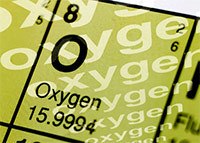Oxidative Therapies as Used in the Treatment of Cancer
Use of hyperbaric oxygen therapy, ozone therapy, and ultraviolet blood irradiation therapy as adjunct cancer treatments.

Oxidative Therapies for Cancer and Degenerative Disease Treatment
Oxidative therapies are important components of a comprehensive treatment program for chronic degenerative diseases, immune disorders and cancer. These treatments aim to increase blood and tissue oxygenation, stimulate metabolic processes and enhance immune functions.
 Oxidative Therapy includes treating the body with extra oxygen. Treatment methods include:
Oxidative Therapy includes treating the body with extra oxygen. Treatment methods include:
- Hyperbaric Oxygen Therapy, intermittent treatment with oxygen at greater than normal atmospheric pressures.
- Ozone Therapy, enriching a certain amount of blood outside the body with an oxygen/ozone (O2 / O3) mixture.
- Ultraviolet Blood Irradiation
Oxidation is an essential energy producing biochemical reaction in the body using various forms of oxygen, for example oxidation enables the body to convert sugar into energy. Even breathing oxygen is an oxidative process.
The immune system uses oxidative energy as a weapon to directly kill infectious agents such as bacteria, viruses, yeast and parasites.
Oxidative Therapies and Cancer
The German Nobel Prize winner Dr. Otto Warburg demonstrated that malignant cells thrive in an anaerobic (oxygen-free) environment whereas normal cells require oxygen to survive.
 Cancerous tumors have a mechanism that reduces the presence of oxygen and stimulates the reproduction of blood vessels, which allows tumors to grow. The increased number of blood vessels around tumors causes constriction and collapse of many vessels which compromises oxygen delivery and further promotes the multiplication of malignant cells.
Cancerous tumors have a mechanism that reduces the presence of oxygen and stimulates the reproduction of blood vessels, which allows tumors to grow. The increased number of blood vessels around tumors causes constriction and collapse of many vessels which compromises oxygen delivery and further promotes the multiplication of malignant cells.
Oxidative therapies help stimulate the immune system, which is of great importance in cancer treatment. They have been shown to induce the production of biological response modifiers called cytokines such as interferons, interleukins and other substances. These cytokines, most notably IL-2 with its anti-tumoral effect, activate macrophages, neutrophils and tumor necrosis factor.
The broad range of other beneficial effects of oxidative therapies includes:
- Improvement of cellular respiration.
- Stimulation of white blood cell production.
- Increase of red blood cell membrane flexibility and effectiveness.
- Stimulation of basic metabolism by accelerating the citric acid cycle.
- Increase of the anti-oxidant enzyme system which scavenges free radicals.
- Inactivation of viruses, bacterial, fungi and protozoan.
Oxidative therapies have been an important part of the Issels Treatment Program since the early 1950s.